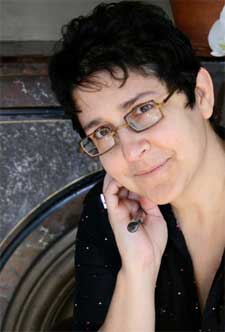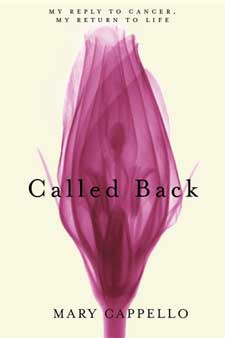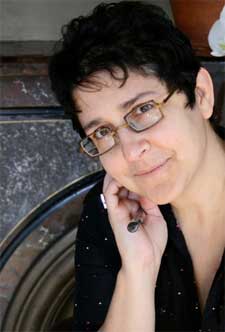 KINGSTON, R.I. – September 14, 2009—Mary Cappello, a professor of English at the University of Rhode Island, was planning a national reading tour for her latest book in the late spring of 2007 when she felt a lump in her breast.
KINGSTON, R.I. – September 14, 2009—Mary Cappello, a professor of English at the University of Rhode Island, was planning a national reading tour for her latest book in the late spring of 2007 when she felt a lump in her breast.
“The moment the suspicious looks start flying among the technicians in mammography you can pretty well tell that your life is going to change,” recalls Cappello about entering the often harrowing world of medicine.
Rather than blink, Cappello looks at her breast cancer straight on with a poet’s eye for incongruity and an intellect’s heart for meaning. She translates those experiences into her newest book, Called Back: My Reply to Cancer, My Return to Life, just published by Alyson books. The book is part memoir, part meditative, and wholly absorbing.
The book follows Cappello’s diagnosis, surgery, chemotherapy, radiation, but it does something different than simply reproduce the standard, neatly packaged redemption narrative. “I hope my approach opens things up rather than closes off aspects of the treatment and disease that we’d rather not discuss, admit, or meditate on,” she says. “To put this another way: What happens inside of the treatment regime is entirely expected, but what happens inside of the book is not—and this establishes both an intellectual and emotional suspense in the book.”
A master weaver of words, the author explains the thread of meaning in the book’s title. Called Back is Emily Dickinson’s epitaph, she says. “But the phrase also ramifies literally with the shock of being called back into mammography (maybe every woman’s greatest fear), and on the pervasive possibility of being called back again even after cancer’s ostensible treatment regime has ended. When I got my diagnosis, my friend, the lesbian writer, Barbara Morris, said, ‘You’ve been called to be in your body’—that stuck with me, it was a sentence I wanted to understand and meditate on, so it has that kind of “calling” in mind as well, the way that a cancer diagnosis calls one to be in one’s body. But it also means to suggest, the necessity for a writer willfully to re-call the experience, to call it back, in order both to transform the experience and make it available to a community of readers.”
Her tone is warm, furious, smart, ironic in short– human—a contrast with the “tone” put in front of cancer patients in forms of “muzak, infantilizing ditties or moralizing instruction manuals that make one responsible for one’s cancer. But it’s easy to demonize the medical world,” the author says. “There’s also a popular cultural world that is very much invested in cancer being talked about in only certain ways (and especially breast cancer), according to certain narrative structures, with certain pre-given words and with it a whole ethos and ideology of acknowledgement (or blindness), treatment, and cure.”
 A diagnosis of cancer is a moment of legibility, but in most cases the cancer is not new, explains Cappello. Her cancer, for instance, was estrogen positive and her2/neu negative, the kind of cancer that takes at least eight years for a tumor to reach the size she had in her body—between one and two centimeters. It is, she says, a garden-variety type of cancer.
A diagnosis of cancer is a moment of legibility, but in most cases the cancer is not new, explains Cappello. Her cancer, for instance, was estrogen positive and her2/neu negative, the kind of cancer that takes at least eight years for a tumor to reach the size she had in her body—between one and two centimeters. It is, she says, a garden-variety type of cancer.
An interesting choice of words for a wordsmith whose passion for flowers compelled the 46-year old professor on that day of diagnosis (June 5, 2007) to invite friends to accompany her to Blithewold Garden in Bristol. “Those gardens are what I wanted and needed. I guess it was my attempt to do something life-affirming in light of my having to face certain precariousness, the newness and uncertainty, the fact of my mortality. “
To mark the one-year anniversary of her diagnosis, she went with friends to The Garden in the Woods in Framingham, Mass. This year, it was raining, so she and friends traveled to Harvard’s Natural History Museum to view a magnificent collection of flowers made out of glass.
Cappello has a full schedule of readings this fall, including readings at URI’s Kingston and Providence campuses. A schedule of readings and appearances follow. For a detailed listing, go to http://www.facebook.com/home.php?#/group.php?gid=88922660977&ref=ts
CALLED BACK by Mary Cappello
FALL 2009 Schedule of Readings and Appearances
Borders Books
Saturday, Sept. 19 at 2 p.m.
116 Bangor Mall Blvd.
Bangor, Maine
Columbia College
Friday, Oct. 2, 5:30 p.m.
Chicago, Illinois
NYC LGBT Center in conjunction with The Susan Komen Foundation
Wednesday, Oct. 7
Reception at 6:30; event begins at 7 p.m.
$10 admission; fee waived for students with ID
208 West 13th S. New York, NY
Robin’s Bookstore
Saturday, Oct. 10, 4 p.m.
Philadelphia, Pa.
Writing the LGBT Italian American Experience
Monday, Oct. 12, 7 p.m.
Barnes and Noble Bookstore
2289 Broadway at 82nd Street, NYC
University of Rhode Island
Wednesday, Oct. 14, 4 p.m.
Swan Hall Auditorium
60 Upper College Road
Kingston, R.I.
The Big ‘C’: Living Fully, Living Healthy
Thursday, Oct. 15, 5 to 9 p.m.; Reading and Signing at 7 pm
Art and Informational Exhibit, Gallery Reception
URI Feinstein Providence, Campus
80 Washington St.
Providence, R.I.
The Center at Five Bridge Inn
Sunday, Oct. 18, 1 p.m.
152 Pine St.
Rehoboth, Mass.
University of Vermont College of Medicine
Friday, Oct. 23, time TBA (early afternoon)
Burlington, Vt.
Twelfth Annual Vermont Breast Cancer Conference
Saturday, Oct. 24, 9 a.m. to 9:45 a.m.
Vermont Cancer Center
Sheraton Burlington Hotel & Conference Center
South Burlington, Vt.
Jersey City University
mid-November
Jersey City, N.J.
URI Feinstein Providence Campus
mid-December
in Professor Naomi Mandel’s “Literature and Medicine Class”
Yale University School of Medicine
Thursday, Dec. 3, 5 p.m.
The Program for Humanities in Medicine
Howard Spiro Lecture Series
New Haven, Conn.
Giovanni’s Room
TBA late December, coinciding with MLA
and part of GLQ Caucus Celebrations
Giovanni’s Room
345 South 12th Street
Center City, Pa.

